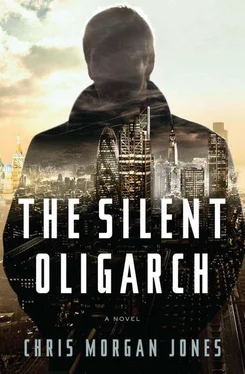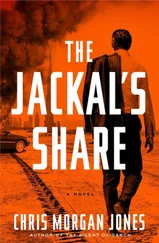They stopped on the quayside; Webster paid and tipped the driver. It was cooler here—later in the day perhaps, and there was a breeze blowing north off the sea. Apartment buildings and stubby palm trees lined the front and in a haze across the water lay the mountains they had just crossed on the mainland. Tourna was on his boat, moored a mile or two out. Webster called the number he had been given and sat down on the edge of the quay to wait, his heavy brown shoes swinging above the water.
The Belisarius was long and sleek, a flash of white low in the water. He was greeted by Leon, the ship’s steward, who explained with the greatest regret that Mr. Tourna had been unexpectedly called away to Athens on business, but would return before nightfall.
BEFORE BECOMING AN INVESTIGATOR, or a spy, or whatever he was, Webster had been a journalist. Fifteen years before, with Yeltsin newly in power and Russia painfully transforming itself, he had gone to Moscow with little more than a degree in Russian to sustain him. Stories were everywhere. He wrote about savings being lost as inflation surged and about coal miners in Siberia unpaid for months; about officials corrupted to demolish fine buildings, tribes threatened by logging in the far east, families from America adopting orphans from Rostov, Samara, Tomsk. At first he wrote the articles and sold them wherever he could, but after six months he was working as a stringer for The Times. He traveled across the country, from the forests of Sakhalin to the dockyards of Murmansk, from the Gulag factories in the Arctic north to the Black Sea health spas where the politburo had spent its summers. Sometimes he went beyond, to Kiev and Tbilisi, Ulan Bator and Tashkent. In eight years he saw more ugliness and hope, more dishonesty, dignity and unexpected happiness than he knew he would again. Life was rich in Russia, even while it was cheap.
But slowly, almost without noticing, he came to tire of the endless round of expectation and disappointment. In 1992 he had believed that Russia would be great again; seven years later he worried that it was destined forever to miss its chance. His editors began to tire, too. And then, three months short of the new century, Inessa had died.
A man called Serik Almaz was charged with her murder, and four weeks after her death he was convicted. He had spent half his life in prison for theft and assault but at his trial, which lasted a morning, he pleaded innocent. Webster couldn’t attend because his visa had been revoked.
Novaya Gazeta ran a piece on its front page about her work and her death in the line of duty; The Times simply reported that she had died. She was the fourth Russian journalist to be murdered that year. At her funeral in Samara, Webster apologized to her husband, he wasn’t sure why, and a month later left Russia for good, his faith undone.
And now he was on a yacht, being kept waiting by the sort of man that Inessa used to write about. It was evening now, and Tourna had still not returned. He pinched a cigarette out of its new pack and lit it with the cheap lighter he had bought at the airport. Just one was all right; it was hot, after all, and he was abroad. A piece of tobacco clung to his lip and he wiped it off with his thumb. There was no wind now and the smoke drifted off the boat in its own time.
Webster read his book and watched the stars appear in the night. Reaching for his drink he caught sight of himself reflected in the black glass of the cabin. He had swum before dinner and his gray hair was stiff and unruly with salt. He had changed his grubby white shirt for his only clean one and was looking respectable, plausible even—anyone would think he belonged here. But he felt ridiculous, just as he felt trapped on this indecently beautiful boat. This wasn’t him. He should have left the moment he found out Tourna wasn’t here. He should probably never have come.
THE NEXT MORNING BEFORE BREAKFAST, with the sun just up over the peninsula, he swam again, diving off the side of the boat into the blue-green sea. It was almost too warm for his taste; this wasn’t Cornwall, where a week before he had swum with the children in water that even in August had shocked the breath from him. And while it was good, it didn’t merit the trip. He had decided that whatever Tourna wanted wasn’t worth this sustained challenge to his dignity: he would get dressed, eat something and leave for Dalaman before the heat came.
As he climbed the ladder back up to the deck he heard the drone of an engine and looked back to see the launch approaching. Tourna was driving, stooping down to control the outboard motor. There was no doubt this was him. He was short and solid, his thick calves like a rugby player’s set firmly apart. He wore baggy navy shorts and a black sports shirt and had tied a white sweater around his neck. His skin was tanned deep and even like cherry wood, his silver hair bright against it.
Webster stood where he was, dripping and holding the towel close across his chest. Tourna sprang up the ladder two rungs at a time and held out his hand. Black sunglasses wrapped around his face.
“Ben. Aristotle Tourna. Delighted you could make it.” His smile revealed two strips of bright white teeth, even and closely packed. His handshake was needlessly strong.
“Likewise.” Webster, taller by a head, gave a half smile. “I was about to give up on you.”
“Sorry. Unavoidable. You had breakfast?”
“No.”
“Me neither. Get dressed and we’ll eat.”
When Webster returned twenty minutes later Tourna was on the phone, talking loudly in Greek and walking back and forth along the side of the boat. Eventually he sat down and started buttering a croissant. His skin sang with health. He had the look of a man who ate well: his jowls were full and his cheekbones fleshy. It was hard to imagine that he denied himself much.
“Better than having breakfast in some hotel on the mainland, no?” he said, beaming at Webster.
“It’s beautiful.”
“I love it here. You see that island over there?” Webster turned. “That’s Symi. Greece. And that, the peninsula, that’s Turkey. But really, it’s all Greece. Always was. One day we’ll take it back. Whenever I come here I feel like I’m on a raid.” He laughed. Webster couldn’t tell if there was mirth in it.
Tourna began to pile spoonfuls of fruit salad into a bowl. As he ate, his leg jigged up and down.
“So, Ben. What’s your background?”
Webster told him about his time in Russia, about finding journalism tame in London after Moscow, about falling into the industry by chance.
“Why did you leave GIC?”
“Too big. Too corporate. A new rule every day. It became hard to get results.”
“And Ikertu’s different?”
“I think it has the right balance.”
Tourna nodded, as if to himself.
“OK. OK. That’s good.” He put his spoon down. “Tell me. What happens to what I tell you here?”
“It stays with me. If you want to engage us and we’re happy to be engaged then I’ll share it with my colleagues.”
“If you’re happy?”
“Yes.”
“Why would you not be happy?”
“We might not like the job. We might not like the client.”
Tourna nodded again, and then laughed. “So I’m on parade here as well?” He took a long drink of orange juice. “That’s OK.” Webster sensed he was being stared at. “OK. Let’s start. You know Russia. Do you know a man called Konstantin Malin?”
“Yes, I do.” He felt his senses jolt awake. Malin. That was unexpected. Malin and his quiet legend.
Tourna nodded and chewed. “I bought a company from him.”
Webster interrupted. “Mr. Tourna, would you mind taking off your sunglasses? I’d be more comfortable if I could see your eyes.”
Читать дальше












